小学英语--时态练习(一般现在时)
小学英语语法时态练习(含答案)
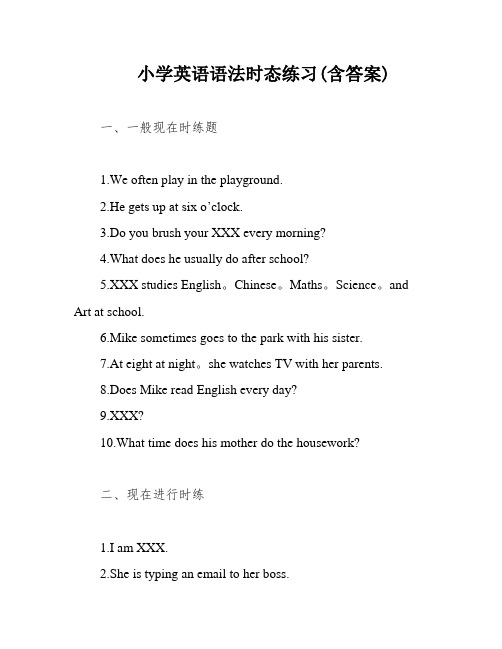
小学英语语法时态练习(含答案)一、一般现在时练题1.We often play in the playground.2.He gets up at six o’clock.3.Do you brush your XXX every morning?4.What does he usually do after school?5.XXX studies English。
Chinese。
Maths。
Science。
and Art at school.6.Mike sometimes goes to the park with his sister.7.At eight at night。
she watches TV with her parents.8.Does Mike read English every day?9.XXX?10.What time does his mother do the housework?二、现在进行时练1.I am XXX.2.She is typing an email to her boss.3.XXX.4.He is cooking dinner for his family.5.XXX.6.The dog is XXX.7.XXX.8.He is reading a book about history.9.XXX.10.XXX.1.I am not looking for a shirt。
I am looking for a tie.2.XXX.3.Miss Baker is XXX.4.What are you doing now。
I am XXX.5.It's nine o'clock。
My father is working in the office.6.Look。
the boy is putting the rubbish into the bin.7.Is he cleaning the classroom。
小学英语小升初专题训练-时态专项练习:一般现在时 50题(含答案)
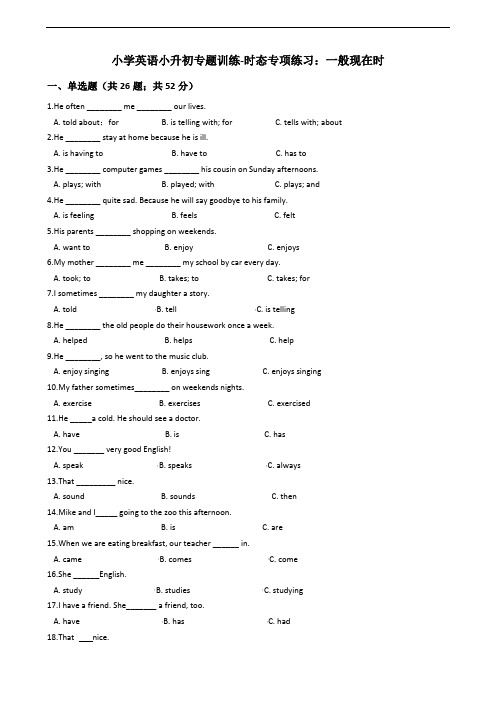
小学英语小升初专题训练-时态专项练习:一般现在时一、单选题(共26题;共52分)1.He often ________ me ________ our lives.A. told about;forB. is telling with; forC. tells with; about2.He ________ stay at home because he is ill.A. is having toB. have toC. has to3.He ________ computer games ________ his cousin on Sunday afternoons.A. plays; withB. played; withC. plays; and4.He ________ quite sad. Because he will say goodbye to his family.A. is feelingB. feelsC. felt5.His parents ________ shopping on weekends.A. want toB. enjoyC. enjoys6.My mother ________ me ________ my school by car every day.A. took; toB. takes; toC. takes; for7.I sometimes ________ my daughter a story.A. toldB. tellC. is telling8.He ________ the old people do their housework once a week.A. helpedB. helpsC. help9.He ________, so he went to the music club.A. enjoy singingB. enjoys singC. enjoys singing10.My father sometimes________ on weekends nights.A. exerciseB. exercisesC. exercised11.He _____a cold. He should see a doctor.A. haveB. isC. has12.You _______ very good English!A. speakB. speaksC. always13.That _________ nice.A. soundB. soundsC. then14.Mike and I_____ going to the zoo this afternoon.A. amB. isC. are15.When we are eating breakfast, our teacher ______ in.A. cameB. comesC. come16.She ______English.A. studyB. studiesC. studying17.I have a friend. She_______ a friend, too.A. haveB. hasC. had18.That nice.A. soundB. soundingC. sounds19.She always _____________ cakes at the weekend.A. makeB. makes20.Mary a very bad cold, so she has to see a doctor.A. makeB. haveC. has21.What ________ Darning ________ at Christmas?A. does; doesB. do; doC. does; do22.He sometimes ______ with his friends.A. playing footballB. play footballC. plays footballD. played football23.I often ________ stories to my little sister.A. readB. readsC. reading24.The earth __________ around the sun.A. goB. goesC. going25.He often ___________ to school by bus.A. goesB. goC. went26.The earth ___________ around the sun.A. goB. goesC. went二、选词填空(词汇运用)(共10题;共14分)27.My mother often ________ (go/goes) to bed at 9:30 pm.28.I usually ________ to school. (walk, walked)29.She often ________(does/did) her homework in the evening.30.Lingling ________ (has/ have) got a new computer.31.The birds ________ (live / lives) in the tree.32.It ________ (say/ says) snakes can't hear.33.My uncle often ________ (go/goes) to work by bus.34.Everyone ________ (need/needs) water.35.The little cat ________ (like/likes) eating fish.36.看图选词并用其适当形式填空。
(完整版)一般现在时练习题含答案解析

一、一般现在时填空题1.We read English at 8:00 a.m. Then our first lesson________(begin) at 8:25 a.m.【答案】begins【解析】【详解】句意:我们早上8点读英语,然后第一课在上午8点25分开始。
句子We read English at 8:00 a.m.是一般现在时,所以句子Then our first lesson________(begin) at 8:25 a.m.也用一般现在时。
主语first lesson是单数,因此谓语用三单形式。
故答案为begins。
2.John with her family often _________ (watch) films at weekends.【答案】watches【解析】【详解】句意:John和她的家人周末常常看电影。
with her family为介词短语作伴随状语,所以本句主语为John,故谓语动词应用单数形式watches。
3.The _______ is a 16-year-old girl in the dancing competition. (win)【答案】winner【解析】【详解】句意:在舞蹈比赛中获胜的是一位16岁的女孩。
win是动词,冠词放在名词前,所以把win改为它的名词winner。
4.Look! The children ________(play)football on the playground. They ________(play)football every Sunday afternoon.【答案】 are playing play【解析】【详解】句意:看!那些孩子们正在操场上踢足球。
他们每周日下午都踢足球。
根据“Look”可知第一句中踢足球的动作正在发生,所以用现在进行时,主语是复数,所以系动词用are,故填are playing;根据“every Sunday afternoon”可知第二句中动作是经常性发生,所以用一般现在时,主语是复数,所以谓语动词用原形play,故填are playing;play。
小六复习-时态练习综合(一般现在时,一般过去时,一般将来时和现在进行时)

时态综合练习(一般现在时,一般过去时,一般将来时和现在进行时)Name________ Class _______一、回答问题。
-How are you going to Canada?(坐飞机)-I am going to Canada by plane.-When is he going to read the magazine?(明天)-He is going to read the magazine tomorrow.Where is Mike going next week?(中山公园)____________________________________________________________ What is Sarah going to do this Sunday?(买礼物)____________________________________________________________ What is John going to do in the park?(溜冰)____________________________________________________________ What is Miss White going to do in the restaurant?(吃美食)____________________________________________________________ Who are you going to Shenzhen with?(我的表兄弟)____________________________________________________________ When are they going to the park?(明天下午)____________________________________________________________ -What did you do in the zoo?(看动物)-I saw animals.-Where did you go last Sunday?(北京)-I went to Beijing lastSunday.-How did you go to Guangzhou?(做火车)-I went to …. by train.When did you go to Foling Lake?(今天早上)____________________________________________________________ What do you often do in the morning every day?(上课,看书)-What does your mother often do every morning?(做早餐和打扫房间)-She often cooks … and cleans the room….-When do you go to school?(7:00)____________________________________________________________ -What are they doing?(读书)-They are reading books.How are you going to Shenzhen?(开小车)———————————————————————————-What is she doing now in the park?(放风筝)-She is flying kites….What is your mother doing?(看电视)———————————————————————————What are John and Mike doing in the zoo?(划小船)———————————————————————————二、请用动词的适当形式填空。
小学英语时态综合练习题
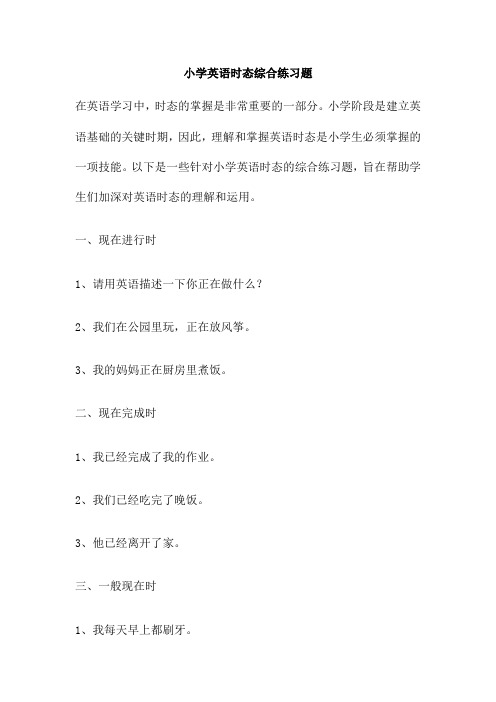
小学英语时态综合练习题在英语学习中,时态的掌握是非常重要的一部分。
小学阶段是建立英语基础的关键时期,因此,理解和掌握英语时态是小学生必须掌握的一项技能。
以下是一些针对小学英语时态的综合练习题,旨在帮助学生们加深对英语时态的理解和运用。
一、现在进行时1、请用英语描述一下你正在做什么?2、我们在公园里玩,正在放风筝。
3、我的妈妈正在厨房里煮饭。
二、现在完成时1、我已经完成了我的作业。
2、我们已经吃完了晚饭。
3、他已经离开了家。
三、一般现在时1、我每天早上都刷牙。
2、我们每周都去公园玩。
3、他每天晚上都读书。
四、一般过去时1、昨天我去了电影院。
2、上周我们去了海滩。
3、昨晚她看了电视。
五、一般将来时1、我明天将要完成作业。
2、我们下周将要去看电影。
3、他将在下个月搬到新家。
以上练习题旨在帮助学生理解和掌握基本的英语时态。
对于小学生来说,时态的学习可能相对复杂,但通过反复练习和实际应用,他们可以逐渐掌握并开始在日常生活中运用这些时态。
教师和家长可以鼓励学生多做类似的练习,帮助他们提高英语时态的理解和运用能力。
小学英语时态练习题一、一般现在时1、I eat apples every day. (我每天吃苹果。
)2、He studies hard every day. (他每天努力学习。
)3、They play basketball every week. (他们每周打篮球。
)二、现在进行时1、I am eating apples now. (我现在正在吃苹果。
)2、He is studying hard now. (他现在正在努力学习。
)3、They are playing basketball now. (他们现在正在打篮球。
)三、一般过去时1、I ate apples yesterday. (我昨天吃了苹果。
)2、He studied hard yesterday. (他昨天努力学习了。
)3、They played basketball yesterday. (他们昨天打篮球了。
外研小学英语时态练习题

外研小学英语时态练习题在小学英语教学中,时态是学生必须掌握的语法点之一。
以下是一些针对小学英语学生的时态练习题,旨在帮助学生巩固和练习不同时态的使用。
练习题一:一般现在时1. 我每天上学。
(I go to school every day.)2. 她喜欢跳舞。
(She likes dancing.)3. 他们经常去图书馆。
(They often go to the library.)练习题二:一般过去时1. 昨天我去了公园。
(Yesterday I went to the park.)2. 他昨天踢了足球。
(He played football yesterday.)3. 我们昨天晚上看了电影。
(We watched a movie last night.)练习题三:一般将来时1. 明天我要参加生日派对。
(Tomorrow I will attend a birthday party.)2. 她将要学习钢琴。
(She is going to learn to play the piano.)3. 他们下个月会去旅行。
(They will go on a trip next month.)练习题四:现在进行时1. 他正在读一本书。
(He is reading a book.)2. 我们正在看电视。
(We are watching TV.)3. 现在外面正在下雨。
(It is raining outside now.)练习题五:过去进行时1. 昨天下午三点钟,我正在做作业。
(At three o'clock yesterday afternoon, I was doing my homework.)2. 昨晚七点,他们正在吃晚饭。
(At seven o'clock last night, they were having dinner.)3. 他昨晚正在画画。
(He was drawing a picture last night.)练习题六:现在完成时1. 我已经完成我的作业。
小学英语六年级所有时态综合练习
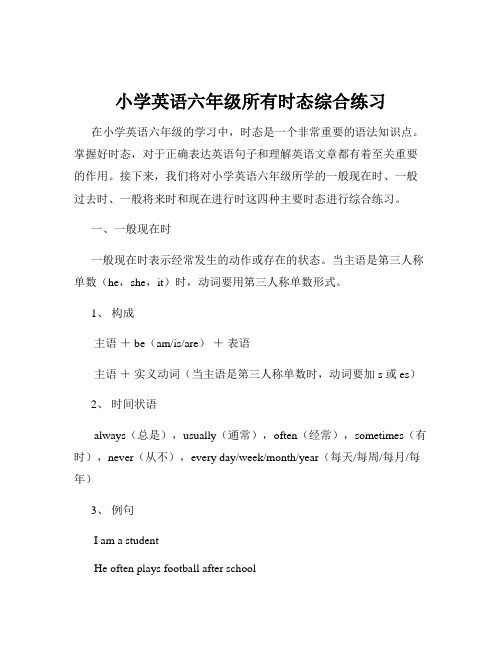
小学英语六年级所有时态综合练习在小学英语六年级的学习中,时态是一个非常重要的语法知识点。
掌握好时态,对于正确表达英语句子和理解英语文章都有着至关重要的作用。
接下来,我们将对小学英语六年级所学的一般现在时、一般过去时、一般将来时和现在进行时这四种主要时态进行综合练习。
一、一般现在时一般现在时表示经常发生的动作或存在的状态。
当主语是第三人称单数(he,she,it)时,动词要用第三人称单数形式。
1、构成主语+ be(am/is/are)+表语主语+实义动词(当主语是第三人称单数时,动词要加 s 或 es)2、时间状语always(总是),usually(通常),often(经常),sometimes(有时),never(从不),every day/week/month/year(每天/每周/每月/每年)3、例句I am a studentHe often plays football after schoolThey are very happy练习:1、 My father ______ (watch) TV every night2、 She ______ (like) music very much3、 The children often ______ (play) in the park二、一般过去时一般过去时表示过去发生的动作或存在的状态。
1、构成主语+ was/were +表语主语+动词的过去式2、时间状语yesterday(昨天),last week/month/year(上周/上个月/去年),ago(以前),in +过去的年份3、例句I was at home yesterdayThey played basketball last weekHe went to Beijing two years ago练习:1、 We ______ (have) a party last night2、 She ______ (buy) a new dress yesterday3、 He ______ (do) his homework an hour ago三、一般将来时一般将来时表示将来要发生的动作或存在的状态。
教科版小学英语四种时态综合练习
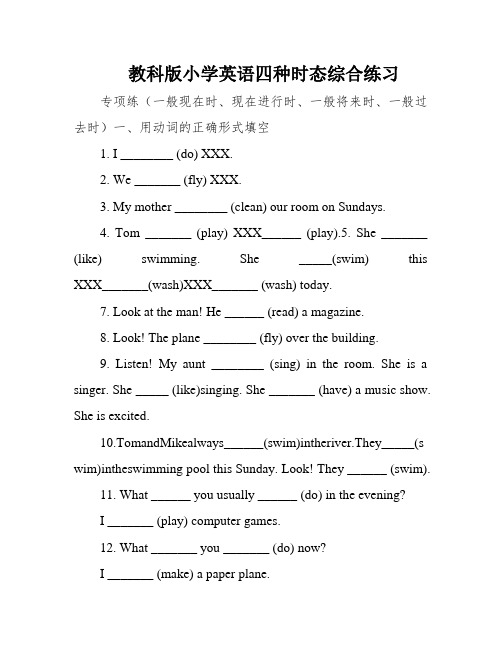
教科版小学英语四种时态综合练习专项练(一般现在时、现在进行时、一般将来时、一般过去时)一、用动词的正确形式填空1. I ________ (do) XXX.2. We _______ (fly) XXX.3. My mother ________ (clean) our room on Sundays.4. Tom _______ (play) XXX______ (play).5. She _______ (like) swimming. She _____(swim) this XXX_______(wash)XXX_______ (wash) today.7. Look at the man! He ______ (read) a magazine.8. Look! The plane ________ (fly) over the building.9. Listen! My aunt ________ (sing) in the room. She is a singer. She _____ (like)singing. She _______ (have) a music show. She is excited.10.TomandMikealways______(swim)intheriver.They_____(s wim)intheswimming pool this Sunday. Look! They ______ (swim).11. What ______ you usually ______ (do) in the evening?I _______ (play) computer games.12. What _______ you _______ (do) now?I _______ (make) a paper plane.13. What _______ he _______ (do)?He ______ (dance).14. What _______ she ______ (do) yesterday?She ______ (visit) her grandparents.15. ______ your mother ______ (read) newspaper in the morning?Yes, She ________.16. _______ you _______ (like) fishing?No, I ______ . I like ______ (swim),but my brother ______ (like).17. How ______ your father _______ (go) to work every day?He ______ (go) by bike. But it’s cold today. He ______ (take) the No.21 bus, andhe _______ (go) to work by XXX.18. _______ the monkey _______ (like) climbing trees? Yes, it _______ .19. What _______ your father ______ (do) after lunch? He _______ (read) XXX _____ he _______ (do) today? He _______ (clean) the XXX! He(clean).20. ________ you ______ (collect) stamps? Yes. I _______ .________ your brother ______ (collect), too? No, he ________ .2、挑选题1. _____ he _____ to the park at 6:30 in the morning? No, he _____ .A. Does; goes; doesB. Does; go;doesn’tC. Does; go; does2.What colour _____ you _____ this bookcase? I _____ it pink.A.are; going to paint; am going to paintB.do; paint; paintC.did; paint; painted3. Tim always _____ a picture at home. He _____ a car now.A. draws; XXX; drawC. draws; draw4. She usually _____ XXX _____ XXX.A. see; drinkB. sees; drinksC. sees; drink5. He usually _____ the dishes at night, XXX _____ XXX; is going to washC. is washing; washes6. Mr. Green usually _____ his newspaper in the evening, but he and his wife _____XXX.A. reads; watchesB.reads; is going to watchC.reads; watched7. Where are the man and the woman? They _____ near the tree.A. sitB. satC. are sitting8. _____ your penpal _____ diving? No, he _____ .He ______ XXX; like;doesn’t; likesB.Does; likes;doesn’t; likeC.Do; like; don’t; likes9. _____ you _____ fishing yesterday? No, we _____ .A. Does; go;doesn’tB. Did; go;XXX; go; don’t10. Open the window, please. Look! He _____ it.A. XXX11. I usually _____ some milk every day. But I _____ XXX; drankB. is drinking; drinkC. drank; am drinking12. Mr. Green often _____ his newspapers at night. But he _____ XXX.A. reads; readsB. reads; readC. reads; is going to read13. The old man _____ playing sports in the park. He _____ XXX; XXX; doesC. like; doing14. What _____ you usually _____ in the evening? I ______ computer games.What _____ you _____ last night? I _____ a book.A. do; do; playB. did; do; playedC. does; do; playsdid; do; readdo; do; readdo; do; am reading15. Where ______ the boy _____ ? He _____ across the XXX; swim; XXX; swimming; is swimmingD.is; swimming; is swimming16. _____ you _____ to music now? Yes, we _____ .A. Do; listen; doB. Did; listen; didC. Are; listening; are17. Put on you coat, please. OK. I ______ it on.A. am puttingB. am going to putC. put18. _____ you ______ coffee? Yes, I ______ .A. Do; like; doB. Did; like; didC. Are; like; am19. Look! Two cats ______ across the wall.A. XXX running20. She _____ tea, but he _____ .。
小学英语语法时态归纳及练习(含答案解析)

英语时态归纳一、一般现在时:标志词:often(经常) sometimes(有时) always(总是) usually(通常) never(从不) every(每一)行为动词词型变化形式:一般现在时动词只有第三人称有词形变化;其他人称(第一人称:I, we;第二人称:you;第三人称复数:they、my friends)动词均用原形。
当主语是第三人称单数时,一般动词在一般现在时句子中的变化规律:1、多数在动词后加s:play—plays like—likes ,2、以s,x,sh,ch,o结尾的动词加es wash–washes catch–catches do–does3、以辅音字母加y结尾,把y改i再加es fly—flies study—studies4、以元音字母加y结尾,直接加s buy – buys5、不规则变化have—has一般现在时基本用法功能1.表示事物或人物的特征、状态。
如:The sky is blue.天空是蓝色的。
2.表示经常性或习惯性的动作。
如:I get up at six every day.我每天六点起床。
3.表示客观现实。
如:The earth goes around the sun.地球绕着太阳转。
The earth is round.构成1. be动词:主语+be(am,is,are)+其它。
如:I am a boy.我是一个男孩。
2.行为动词:主语+行为动词(+其它)。
如:We study English.我们学习英语。
句型肯定句:A.be动词:主语+ be + 其它成分He is a worker.B.行为动词:主语+动词(注意人称变化) +其它成分We like the little cat.否定句:A.be动词:主语+ be + not+其它成分They are not students.B.行为动词:主语+助动词(do/does) + not+动词原形+其它成分We don’t like the little cat.一般疑问句:A.be动词:Am / Is /Are +主语+ 其它成分Are you a teacher? Yes, I am. / No, I am not.Are they students of your school. Yes, they are / No they aren’t.B.行为动词:助动词(Do/Does)+主语+动词原形+ 其它成分Do you like it? Yes, I do. / No. I don’t .Does he(she) like it? Yes, he( she )does. / No, he ( she )doesn’t.特殊疑问句:疑问词+ 一般疑问句A.be动词:How many students are there in your school?B.行为动词:What do you usually do on Sunday?一般现在时动词be和have的变化形式1.动词Be 叫连系动词, 用法:第一人称单数用am,第三人称单数用is,其它人称用are。
(完整版)一般现在时练习题及答案
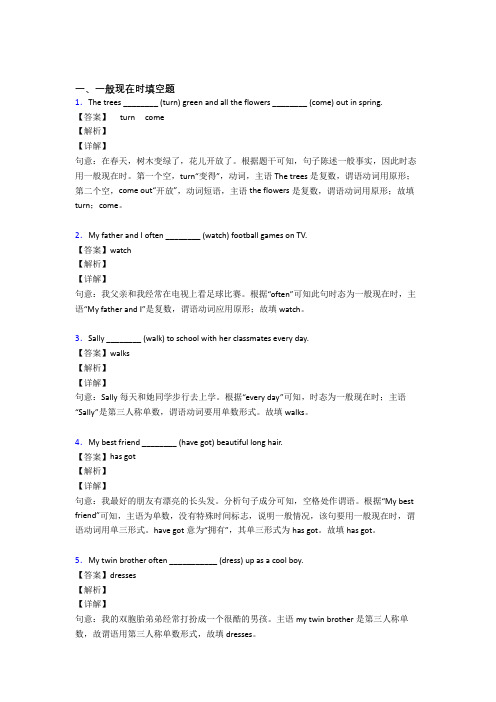
一、一般现在时填空题1.The trees ________ (turn) green and all the flowers ________ (come) out in spring.【答案】 turn come【解析】【详解】句意:在春天,树木变绿了,花儿开放了。
根据题干可知,句子陈述一般事实,因此时态用一般现在时。
第一个空,turn“变得”,动词,主语The trees是复数,谓语动词用原形;第二个空,come out“开放”,动词短语,主语the flowers是复数,谓语动词用原形;故填turn;come。
2.My father and I often ________ (watch) football games on TV.【答案】watch【解析】【详解】句意:我父亲和我经常在电视上看足球比赛。
根据“often”可知此句时态为一般现在时,主语“My father and I”是复数,谓语动词应用原形;故填watch。
3.Sally ________ (walk) to school with her classmates every day.【答案】walks【解析】【详解】句意:Sally每天和她同学步行去上学。
根据“every day”可知,时态为一般现在时;主语“Sally”是第三人称单数,谓语动词要用单数形式。
故填walks。
4.My best friend ________ (have got) beautiful long hair.【答案】has got【解析】【详解】句意:我最好的朋友有漂亮的长头发。
分析句子成分可知,空格处作谓语。
根据“My best friend”可知,主语为单数,没有特殊时间标志,说明一般情况,该句要用一般现在时,谓语动词用单三形式。
have got意为“拥有”,其单三形式为has got。
故填has got。
5.My twin brother often ___________ (dress) up as a cool boy.【答案】dresses【解析】【详解】句意:我的双胞胎弟弟经常打扮成一个很酷的男孩。
五年级英语时态练习题

五年级英语时态练习题在五年级的英语学习中,掌握时态是非常重要的。
以下是一些练习题,帮助学生巩固对英语时态的理解。
练习一:填空题1. I am reading a book now. (现在进行时)2. She watches TV every evening. (一般现在时)3. They played football yesterday. (一般过去时)4. We will go to the park tomorrow. (一般将来时)5. He has been to the museum already. (现在完成时)练习二:改错题1. She is going to the store. (改为过去时)- 正确:She went to the store.2. They are playing soccer. (改为一般现在时)- 正确:They play soccer.3. I was doing my homework. (改为现在进行时)- 正确:I am doing my homework.4. He will visit his grandparents. (改为一般过去时)- 正确:He visited his grandparents.5. We have finished our project. (改为一般过去时)- 正确:We finished our project.练习三:翻译题1. 我正在学习英语。
(Translate into English)- 正确:I am learning English.2. 他昨天去了图书馆。
(Translate into English)- 正确:He went to the library yesterday.3. 我们明天将去动物园。
(Translate into English)- 正确:We will go to the zoo tomorrow.4. 他们正在踢足球。
(完整版)一般现在时练习题及答案

14.I think the boy ________ (look) like his father. 【答案】looks 【解析】 【详解】 句意:我觉得这个男孩看起来像他的父亲。根据语境可知,该句为一般现在时,主语“the boy”是第三人称单数,谓语用动词的第三人称单数形式,“look”的第三人称单数形式是 “looks”。故填 looks。
2.Many kids ________ (在……有困难) getting along with their parents nowadays. 【答案】have trouble##have problems##have difficulty 【解析】 【详解】 句意:现在很多孩子与父母相处有困难。“在……有困难”为 have trouble/problems/difficulty doing sth.。本句为一般现在时,主语 many kid 是复数,动词 have 使用原形。故填 have trouble/problems/difficulty。
24.Sam often ________ (fly) kites with his friends on windy days. 【答案】flies 【解析】 【详解】 句意:萨姆经常在刮风的日子和他的朋友放风筝。根据“often”可知,该句为一般现在时, 主语“Sam”是第三人称单数,谓语用动词的三单形式,“fly”的三单形式是“flies”。故填 flies。
英语一般现在时练习题20篇
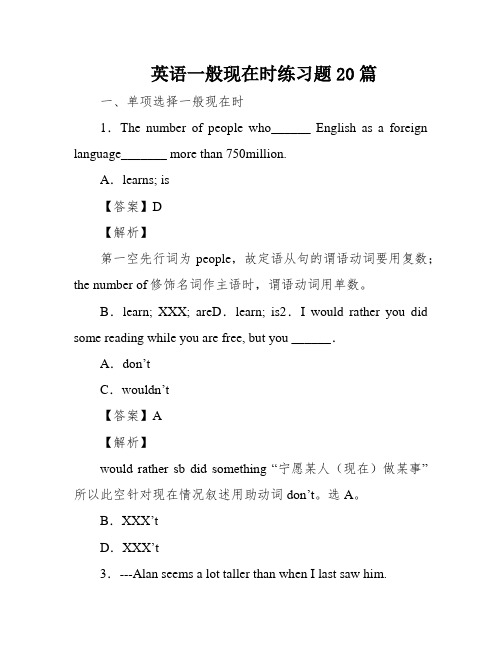
英语一般现在时练习题20篇一、单项选择一般现在时1.The number of people who______ English as a foreign language_______ more than 750million.A.learns; is【答案】D【解析】第一空先行词为people,故定语从句的谓语动词要用复数;the number of修饰名词作主语时,谓语动词用单数。
B.learn; XXX; areD.learn; is2.I would rather you did some reading while you are free, but you ______.A.don’tC.wouldn’t【答案】A【解析】would rather sb did something “宁愿某人(现在)做某事”所以此空针对现在情况叙述用助动词don’t。
选A。
B.XXX’tD.XXX’t3.---Alan seems a lot taller than when I last saw him.---He. He’sgrown a foot since you saw him in Shanghai.A.isC.has been【答案】A【解析】试题分析:考查时态。
第二人的回答He _____.是紧随上句,所以时态和第一句的seems保持一致即:一般现在时。
句意:—XXX比我当初看见他的时候似乎高了一点。
—,确实,自从你上次在上海见到他又长高了一英尺。
故选.A考点:考察时态B.will beD.was4.—Have you got any news of the exam results?—No, but I’ll contact you as so on as Ithem.A.am getting B.gotC.will get D.have got【答案】D【解析】考察动词时态。
句意:——你有考试成效的音讯吗?——没有,但我有了会尽快接洽你的。
一般现在时练习题(含答案)经典

一般现在时练习题(含答案)经典一、一般现在时1.Xiao Ming never ________ home on foot. She often takes the subway.A. go toB. goes toC. walksD. goes【答案】 D【解析】【分析】句意:小明从不不行回家,他经常乘地铁。
词组:go home回家。
主语Xiao Ming 是第三人称单数,故用动词后加-s,因此选D。
【点评】考查一般现在时的第三人称单数形式。
2.I think joining the English club ________ the best way to improve your English.A. areB. wasC. isD. were【答案】 C【解析】【分析】句意:我认为加入英语俱乐部是提高英语水平的最好方法。
描述客观事实用一般现在时,主语是动名词joining,谓语是单三式,故be用is,故选C。
【点评】考查时态,注意主谓一致的用法。
3.She _____ out alone at night.A. dare not to goB. dares not goC. doesn't dare to goD. doesn't dares go【答案】 C【解析】【分析】句意:晚上她不敢一个人出去。
dare可以作情态动词也可以作行为动词,作情态动词时,后面直接跟动词原形,没有人称与数的变化,构成否定时直接在dare 后加not,作行为动词时后跟动词不定式,构成否定需要助动词,故答案是C。
【点评】考查dare的用法,注意dare做情态动词和行为动词的用法上的区别。
4.If he _____ the money, he _____ a lot of clothes.A. has; will buyB. had; boughtC. had; would buyD. had; will buy【答案】 A【解析】【分析】句意:如果他有钱,他会买许多衣服。
小学英语时态练习题
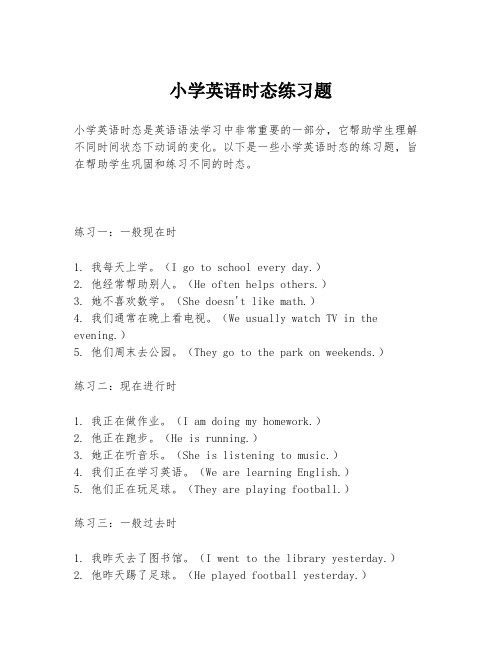
小学英语时态练习题小学英语时态是英语语法学习中非常重要的一部分,它帮助学生理解不同时间状态下动词的变化。
以下是一些小学英语时态的练习题,旨在帮助学生巩固和练习不同的时态。
练习一:一般现在时1. 我每天上学。
(I go to school every day.)2. 他经常帮助别人。
(He often helps others.)3. 她不喜欢数学。
(She doesn't like math.)4. 我们通常在晚上看电视。
(We usually watch TV in the evening.)5. 他们周末去公园。
(They go to the park on weekends.)练习二:现在进行时1. 我正在做作业。
(I am doing my homework.)2. 他正在跑步。
(He is running.)3. 她正在听音乐。
(She is listening to music.)4. 我们正在学习英语。
(We are learning English.)5. 他们正在玩足球。
(They are playing football.)练习三:一般过去时1. 我昨天去了图书馆。
(I went to the library yesterday.)2. 他昨天踢了足球。
(He played football yesterday.)3. 她昨天看了电影。
(She watched a movie yesterday.)4. 我们昨天去了动物园。
(We went to the zoo yesterday.)5. 他们昨天看了一场音乐会。
(They watched a concert yesterday.)练习四:一般将来时1. 我明天会去购物。
(I will go shopping tomorrow.)2. 他明天要参加一个生日派对。
(He is going to attend abirthday party tomorrow.)3. 她明天会去图书馆。
小学五大时态练习题

小学五大时态练习题一、一般现在时(Simple Present Tense)1. 填空题:请用括号中所给词的适当形式填空。
- My father (go) to work by bus every day.- She (have) a little dog.2. 选择题:选择正确的答案。
- What time (do/does) your brother usually (get up/get up) in the morning?A. do, get upB. does, get upC. do, gets upD. does, gets up3. 改错:找出下列句子中的错误并改正。
- He plays the piano very well. (He played the piano very well.)二、一般过去时(Simple Past Tense)1. 填空题:请用括号中所给词的过去式填空。
- I (visit) my grandparents last weekend.- They (eat) lunch at the restaurant yesterday.2. 选择题:选择正确的答案。
- Where (did/does) you (go/goes) yesterday?A. did, goB. does, goesC. did, goesD. does, go3. 改错:找出下列句子中的错误并改正。
- She walked to school yesterday. (She walks to school yesterday.)三、一般将来时(Simple Future Tense)1. 填空题:请用括号中所给词的适当形式填空。
- I (will go) to the library tomorrow.- They (have) a birthday party next week.2. 选择题:选择正确的答案。
小学上册英语专项练习:六年级时态
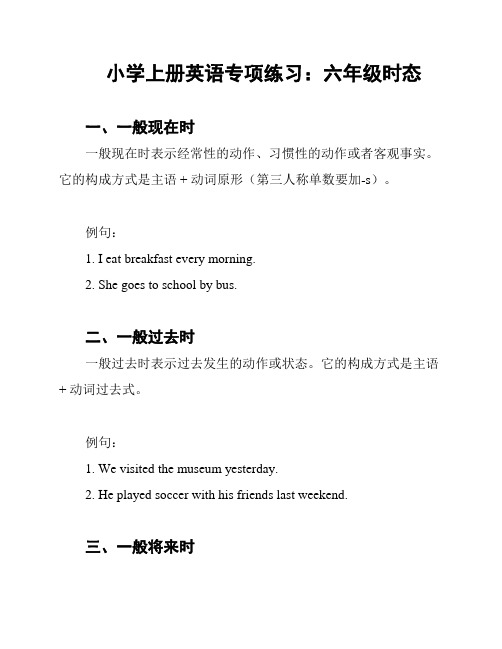
小学上册英语专项练习:六年级时态一、一般现在时一般现在时表示经常性的动作、习惯性的动作或者客观事实。
它的构成方式是主语 + 动词原形(第三人称单数要加-s)。
例句:1. I eat breakfast every morning.2. She goes to school by bus.二、一般过去时一般过去时表示过去发生的动作或状态。
它的构成方式是主语+ 动词过去式。
例句:1. We visited the museum yesterday.2. He played soccer with his friends last weekend.三、一般将来时一般将来时表示将来要发生的动作或状态。
它的构成方式是主语 + will + 动词原形。
例句:1. I will go to the park tomorrow.2. She will study English next year.四、现在进行时现在进行时表示现在正在进行的动作。
它的构成方式是主语 + am/is/are + 动词-ing。
例句:1. They are playing soccer in the park.2. She is reading a book right now.五、过去进行时过去进行时表示过去某个时间正在进行的动作。
它的构成方式是主语 + was/were + 动词-ing。
例句:1. I was studying when the phone rang.2. They were playing games at that time.六、现在完成时现在完成时表示过去发生的动作对现在产生的影响或结果。
它的构成方式是主语 + have/has + 过去分词。
例句:1. She has finished her homework.2. We have visited the Great Wall.七、过去完成时过去完成时表示过去某个时间或动作之前已经发生的动作。
2024小升初英语练习专题11 时态一(一般现在时) (学生版+解析版)

专题11 时态一(一般现在时)小贴士1.一般现在时的三单用法:当主语是第三人称单数时,谓语动词用第三人称的单数形式。
谓语动词的第三人称单数形式的变化规则如下:1)一般在动词后直接加s。
如:talk –talks, live –lives, stay-stays。
2)以s, x., ch, sh或o结尾的动词在其后加es。
如:watch –watches, wash –washes, go –goes。
3)以辅音字母加y结尾的动词,把y变成i再加es。
如:carry – carries, fly –flies。
4)特殊的,如:have的第三人称单数为has。
2.用法a.表示经常发生的动作、行为或存在的状态。
常用的时间状语有:often, usually, always, sometimes, seldom, never, every day/week/ year…等。
例如: I go to school every day except Sunday.除了星期日,我每天上学。
b.表示一种客观事实或普遍真理,或在谚语中。
例如: The earth moves/ goes around the sun.地球绕着太阳转。
时态(一般现在时)专练一、单项选择1.—How often ________ your father cook for you?—________.A.do, Two times B.does, NeverC.is, Once a week D.did, Seldom2.My brother usually ________ up late but tomorrow he ________ up early.A.gets; get B.get; will get C.gets; will get D.get; will gets 3.Now his father seldom ________ out for a walk after supper.A.go B.went C.goes D.gone 4.Trees _____ our city ______.A.make; clean B.makes; clean C.making; clean5.She ________ every morning.A.exercise B.exercising C.exercises D.exercised 6.My best friend ________ a Smartwatch, but I ________.A.doesn’t have; do B.doesn’t have; have C.don’t have; do D.don’t have; have 7.—My friend Lisa often ________ me with my lessons.—________ kind she is! May I become her friend, too?A.help; How B.helps; How C.help; What D.helps; What 8.—Do you have an ________ sister, Tony?—Yes, I do. And she often ________ a bike to the beach with me.A.older; ride B.older; rides C.elder, ride D.elder, rides 9.On Saturdays Susan ________ some running and goes shopping with Mary.A.is doing B.will do C.does D.go 10.—How does Lily go to school every day?—Lily ________ far from school. She goes to school by bus.A.lives B.is living C.live D.living11.My son is only 12 years old, but he is the tallest in our family. He ________ so fast.A.grows B.will grow C.grew D.has grown12.Every day I __________ sports with my parents to keep healthy.A.am doing B.do C.did D.will do13.—Where does your sister have lunch?—She usually _________ lunch at school.A.had B.has C.is having D.will have14.Because of COVID-19(新冠肺炎), my friend always ________ food and clothes online(线上).A.buying B.buys C.to buy D.buy15.Lined with trees and flowers, the streets ________ our city more attractive than before.A.would make B.was making C.make D.made16.My brother often ________ to the water park to have fun in summer.A.go B.goes C.will go D.went17.Now my father ______ his bike to work every day instead of driving.A.rides B.is riding C.rode D.will ride18.—Tina, what do you usually do at weekends?—I usually ________ swimming with my parents.A.go B.goes C.going D.went19.Mary _______ the piano very well, but she is too busy to play these days.A.is playing B.played C.plays20.It often ________ in summer. Don’t forget to take an umbrella with you.A.rain B.is raining C.rains D.will rain21.I always ________ volleyball with my classmates after school, but Gina always ________ TV at home.A.play; watchs B.plays; watchC.play; watches D.plays; watches22.Lisa always gets A in math. She ________ it well.A.don’t learn B.learns C.doesn’t learn D.learn23.Sam often ________ newspapers after supper. But today he is ________ a letter.A.reads; writing B.reads; writesC.is reading; writes D.is reading; writing24.Millions of tourists ________ the Great Wall every year.A.visit B.will visit C.visited D.have visited25.—Excuse me, what time ________ the concert ________?—Well, in fact you’re late. It ________ 20 minutes ago.A.did...begin; began B.does...begin; began C.did…begin; begins D.does...begin;begins26.His father ________ write by hand, but now he ________ computer to write.A.used to, used B.is used to, used toC.is used for, used to D.used to, uses27.—Where is Mr. Brown?—He ________ in the park. He ________ here every Sunday afternoon.A.walks; walks B.walks; is walking C.is walking; walks28.—Can I help you, sir?—Yes. I bought this radio here yesterday, but it _______.A.works B.worked C.doesn’t work D.isn’t work29.Mr. Black usually ________ TV at night. Now he ________ a basketball game on TV.A.watches; watching B.sees; seeingC.sees; is seeing D.watches; is watching30.Our English teacher always ________ us ________ try our best to realize the dream.A.encourage; to B.encourages; to C.encourage; with D.encourages; with31.My father likes football but he ________ plays it. He only ________ football matches on TV!A.always; watch B.never; watches C.often; watched D.usually; will watch32.—________? —She is of medium height.A.What does your cousin like?B.What did your cousin like?C.What does your cousin look like?D.What was your cousin like?33.—Look! It ________ outside.—Yes. It often ________ here in summer.A.rains; raining B.is raining; rains C.is raining; rain D.rains; raining 34.The students will go to the Palace Museum if it ________ tomorrow.A.won’t rain B.isn’t raining C.doesn’t rain D.don’t rain 35.Water _______ 70% of the human body.A.is made up B.makes up C.makes up of D.make up 36.—We’ll go for a picnic if it ________ this Sunday.—Wish you a lovely weekend.A.rain B.doesn’t rain C.won’t rain D.rains 37.Lily ________ about the question at the moment, and now she ________ it.A.is thinking, is understanding B.is thinking, understandsC.thinks, understands D.thinks, is understanding38.Her father is a teacher. He ________ in a high school.A.teach B.teachs C.teaches D.teaching 39.—What does David like?—He likes ________ basketball, so he often ________ it in the afternoon.A.to play; playing B.playing; to playC.playing; plays D.plays; to play40.—Mom, dad often ________ after dinner. But now he is sleeping.—He is very tired.A.walk B.will walk C.is walking D.walks 41.—________ Jim ________ a new phone?—Yes. He likes it very much.A.Does; has B.Do; have C.Does; have D.Does; like 42.We ________ a Chinese class today. We ________ an English class now.A.aren’t having; are having B.don’t have; haveC.aren’t having; have D.don’t have; are having43.She is very rich and she ________ three houses.A.get B.have C.has D.had44.My sister ________ very well.A.sing B.sings C.singing D.to sing45.—Hurry up. Look at the timetable. The last bus ________ at 11:30 p.m.—Don’t worry. We still have 10 minutes ________.A.leave; left B.left; leaves C.leaves; left D.will leave; leaves46.The boy ________ his homework after school every day.A.do B.doing C.is doing D.does47.I have a soccer, but my friend ________.A.don’t B.does C.doesn’t D.do48.He ________ a sister, but he ________ a brother.A.has; don’t hasB.have; don’t haveC.has; doesn’t hasD.has; doesn’t have49.Susan likes tennis, but she ________ a tennis ball.A.don’t have B.aren’t have C.doesn’t D.doesn’t have50.Michael usually ________ meat and vegetables.A.eat B.eatsC.is eating D.to eat51.She usually __________ her mother in the afternoon, but this afternoon she __________ a letter.A.helps; writes B.is helping; is writing C.is helping; writes D.helps; is writing52.—Poppy, with Eddie and Hobo, ________ a movie after dinner every evening.—How interested they are in it!A.watches B.watch C.are watching D.is watching53.— _________ he ________ a white shirt?— No. He has a black one.A.Does; has B.Do; has C.Does; have D.Do; have54.Mary ________ a gift from a friend of hers, but she doesn’t want to ________ it.A.receives; accept B.accepts; receive C.receive; accepts D.accept; receives55.My mother often ________ presents ________ my grandmother.A.buy; for B.buys; for C.is buying; for D.buys; to56.Sometimes my father _________ to work ________ night.A.go; at B.goes; at C.go; in D.goes; in57.Tom usually ________ English books in the morning. But now he ________ basketball.A.reads; plays B.is reading; plays C.reads; is playing58.Kangkang enjoys ________ football very much, but Han Mei ________.A.playing; doesn’t B.play; doesn’tC.to play; didn’t D.playing; didn’t59.—Can you give me a hand, Betty?—But Andy, you ________ my help every five minutes. I ________ TV at this moment.A.need, watch B.are needing, watchC.need, am watching D.are needing, am watching60.She ________ to work by bus.A.prefer to going B.prefer going C.prefers to go D.prefers go61.—What do you know about Mr. Lin?—He often ________ time ________ his children.A.takes; to help B.took; helped C.take; help D.takes; helping62.—What do you think of your Maths teacher?—He’s always strict _______ us and he never _______.A.with, smile B.about, smiles C.about, laugh D.with, smiles63.Jack often ________ two hours a day ________ TV.A.spends; watching B.spent; watches C.spends; watches D.spent; watching 64.Mike and David _______ their beds by themselves.A.doesn’t make B.makesC.don’t make D.can makes65.My sister usually ________ online on weekends.A.go B.goesC.will go D.is going66.Bill can’t play games if he ________ his homework.A.doesn’t B.don’t C.doesn’t finish D.don’t finish 67.My mother always ________ me a nice present on my birthday.A.gives B.gave C.give D.is giving 68.—________ does he ________ English class?—He has English every day.A.What time; hasB.When; hasC.What time; haveD.When; have69.We ________ at home if it ________ tomorrow.A.stay; rains B.will stay; rainsC.will stay; will rain D.stay; will rain70.Three years ago, I ________ in a primary school and now I ________ in a middle school.A.was; was B.am; am C.was; am D.am; was 71.My mum always ______ me to stick to my dream when I want to give up.A.encourage B.encouraged C.encourages D.will encourage 72.—What do you think of your English teacher?—She’s kind and friendly. She ________ on well with everyone in our class.A.gets B.got C.will get D.was getting 73.Sam ________ playing the guitar but his brother doesn’t.A.has loved B.will love C.loved D.loves 74.The beautiful girl ________ long hair.A.has B.have C.is D.are 75.Andy with Millie ________ to school every weekday.A.walks B.walking C.walk76.—________ your sister have a computer?—I don’t think she has _________.A.Do; it B.Does; one C.Do; one D.Does; it 77.Millie, ________ her mother, ________ singing.A.like; likes B.likes; likes C.like; like D.likes; like 78.He ________ at 6:30 a.m. on weekdays, but he never ________ at weekends.A.do morning exercise; do exercises B.does morning exercises; do exercises C.does morning exercises; does exercise D.does morning exercises; does exercises 79.Jim ________ “I can ________ Chinese now.”A.say, speak B.says, speak C.speaks, say D.speak, speak 80.Tom isn’t ________ his mother, but he ________ her very much.A.likes; like B.like; likes C.likes; likes D.like; like 81.The boy with his friends often ________ a kite on Sundays in spring.A.fly B.flying C.flies D.to fly82.I ________ a toy car ________ my friend.A.want to buy; for B.wants to buy; toC.want buy; for D.wants buy; for83.Uncle Joe ________ ________.A.looks; young B.look; young C.looking; young D.looks; younger 84.My mother is a good ________, and she always ________ delicious food for us.A.cooker; cooks B.cook; cooks C.cook; cooker D.cooker; cooker 85.His mother often ________ at 6:30 in the morning.A.wakes up him B.wake up himC.wakes him up D.wake him up86.I don’t know if (是否) it ________ tomorrow, but if (如果) it ________, I’ll stay at home.A.will rain; rains B.will rain; will rain C.rain; will rain D.rains; rains 87.Every winter many tourists ________ Hainan.A.visits B.visit C.will visit D.visited 88.The earth is a planet and it ________ around the sun.A.turns B.turned C.has turned D.will turn 89.My uncle usually ________ tea after dinner, but now he ________ coffee.A.drinks; drinks B.drinks; is drinking C.is drinking; is drinking90.—Jim ________ computer games now, right?—Yes. He ________ computer games for half an hour every day.A.is playing; plays B.plays; is playing C.is playing; is playing D.plays; plays 91.If Emily ________ back early, we’ll go to see the film together.A.came B.will come C.comes D.is coming92.Mary ________ her grandparents.A.live in B.live with C.lives with D.live at93.The old man sometimes ________ to the park ________ foot.A.go; on B.goes; on C.go; by D.goes; by94.John usually ________ TV after dinner for a short time. But now he ________ computer games.A.watch; plays B.watch; is playing C.watches; is playing D.watches; playing95.Every museum ________ a lot of history.A.has B.have C.having D.had96.It ________ me 3 hours to learn English every day.A.takes B.taking C.taken D.took97.There ________ a lot of housework every day. I feel very tired.A.is B.are C.was D.were98.Although Maths is difficult to learn, students never ______.A.give them up B.gave it upC.give it up D.give up them99.Many parents are busy working and always ________ their children ________.A.leave; alone B.left; alone C.leave; lonely D.left; lonely100.—Is your home near your school, Jack?—No, my home ________ in the east of our city, ________ my school is in the west.A.lie; but B.lies; but C.lays; so D.lay; and专题11 时态一(一般现在时)小贴士1.一般现在时的三单用法:当主语是第三人称单数时,谓语动词用第三人称的单数形式。
小学六年级英语时态练习题及答案

小学六年级英语时态练习题及答案一、时态概念回顾在学习英语时态之前,我们首先需要了解时态的概念。
时态指的是动词表示的动作或状态发生的时间。
英语中常用的时态有以下几种:一般现在时、一般过去时和一般将来时。
在学习英语时态时,我们需要掌握每种时态的基本用法和表示的时间。
二、一般现在时练习题1. 选择正确的动词形式填空。
1.He ______ (go/goes) to school every day.2.My sister ______ (likes/like) playing basketball.3.They ______ (watch/watches) TV in the evening.4.The train ______ (arrive/arrives) at 6 o’clock.5.I ______ (play/plays) the piano on weekends.2. 根据句子的意思,选择正确的答案。
1.______ your parents work in a factory? (Does/Do)2.We ______ basketball after school. (plays/play)3.Tom ______ a sandwich for lunch. (eat/eats)4.______ your brother like swimming? (Does/Do)5.My teacher ______ English very well. (teach/teaches)答案:1.goes2.likes3.watch4.arrives5.play6.Do7.play8.eats9.Does10.teaches三、一般过去时练习题1. 选择动词的适当形式填空。
1.He ______ (go/went) to the park yesterday.2.They ______ (watch/watched) a movie last night.3.She ______ (visit/visited) her grandparents on the weekend.4.We ______ (play/played) football yesterday.5.The cat ______ (catch/caught) a mouse just now.2. 根据句子的意思,选择正确的答案。
小学英语四种时态练习
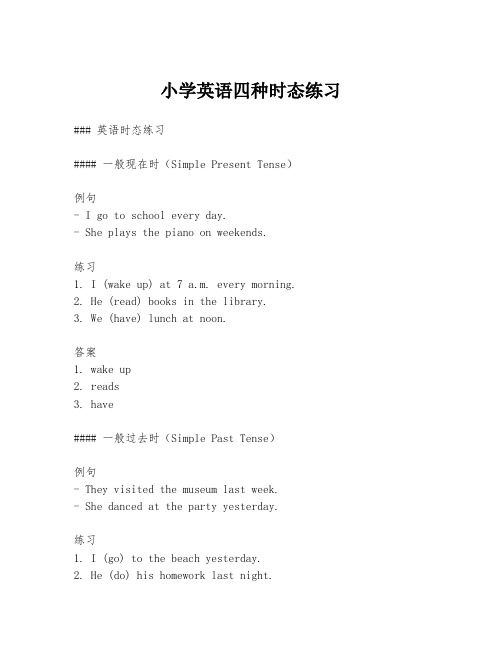
小学英语四种时态练习### 英语时态练习#### 一般现在时(Simple Present Tense)例句- I go to school every day.- She plays the piano on weekends.练习1. I (wake up) at 7 a.m. every morning.2. He (read) books in the library.3. We (have) lunch at noon.答案1. wake up2. reads3. have#### 一般过去时(Simple Past Tense)例句- They visited the museum last week.- She danced at the party yesterday.练习1. I (go) to the beach yesterday.2. He (do) his homework last night.3. They (see) a movie last weekend.答案1. went2. did3. saw#### 一般将来时(Simple Future Tense)例句- She will have a birthday party tomorrow. - We will go to the zoo next week.练习1. I (start) a new job next Monday.2. They (travel) to Japan next year.3. She (buy) a new dress for the party.答案1. will start2. will travel3. will buy#### 现在进行时(Present Continuous Tense)例句- He is reading a book right now.- They are playing football in the park.练习1. I (write) an email to my friend.2. She (study) for her exam.3. We (wait) for the bus.答案1. am writing2. is studying3. are waiting附加练习例句- The cat is sleeping under the table.- They are having dinner at the restaurant.练习1. The children (play) with their toys.2. The teacher (explain) the lesson.3. The birds (sing) in the morning.答案1. are playing2. is explaining3. sing (注意:这里使用了一般现在时,因为描述的是习惯性动作)。
